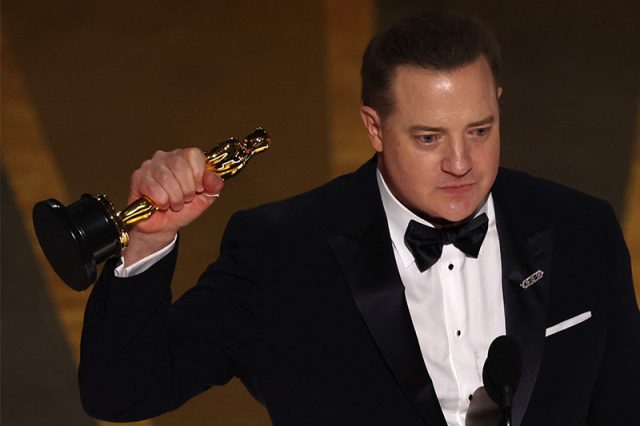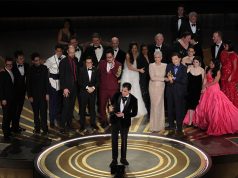
This story contains spoilers about The Whale.
The Whale, which claimed Oscar wins in 2023 including for Best Lead Actor and Best Supporting Actress, is now on Amazon Prime in Canada. Those who are catching up on award winners from this year could consider it for holiday viewing.
When the film was released, much popular commentary focused on treatment of the main protagonist in the film, Charlie (Brendan Fraser), and how the framing of his fatness is likely to harm fat people and seems one-dimensional, rendering him a symbol in a way that dehumanizes him.
Feminist philosopher Kate Manne also took issue with how the film depicts Charlie’s daughter, Ellie (Sadie Sink), arguing, “the film never advances her perspective more than a millimeter.”
The film, which is set in the confined space of one apartment, and which sees Charlie long for a hopeful outcome for his daughter even while he expresses self-hatred, powerfully and uncomfortably asks viewers to consider the world from Charlie’s eyes.
I watched this film as a former secondary English teacher who has researched representations of adolescents in literature and popular media, and who is concerned with how literary and media representations shape teens’ and adults’ sense of adolescent lives — and how teens’ stories are reflected in media.
Here’s my breakdown of what I hope viewers might think about when watching The Whale.
The silenced students
As an instructor, Charlie’s passionate insistence on the importance of truth in writing demonstrates that he cares about how his students express their authentic selves on the page.
Nevertheless, his approach to teaching is concerning. First, there is the complicated background knowledge that Charlie’s late romantic partner, Alan, was a former student. While teaching his current class, he sends an inflammatory and emotional email to everyone that includes the line “Fuck these ridiculous essays,” which leads to his firing.
Before he is replaced, Charlie at last turns his online camera on after pretending it was broken. The students quietly appear to be a mixture of struck, amused and even voyeuristic; one appears to start recording. Charlie flings his laptop to the floor while still in session.
I hoped the film would return to students after this moment, wondering how this intense experience might impact their relationship to education. However, viewers don’t see them again.
The mistreated missionary
Then there is Thomas (Ty Simpkins), a church missionary who seems to be a teenage runaway. Thomas repeatedly visits Charlie and tries to connect with him, but is put in difficult positions when Charlie has medical episodes but refuses professional help.
Instead, Charlie requests confusing emotional labor and care work such as reading Charlie’s daughter’s middle school Moby Dick essay aloud instead of calling 911.
Charlie’s friend and caretaker, Liz (Hong Chau), is also tough on Thomas in different ways. She critiques his church and vacillates between treating him like a pest and something of a punching bag while demanding he help Charlie around the apartment. Thomas seems an earnest and naive young person, constantly returning to Charlie’s apartment despite mistreatment.
‘Evil’ Ellie
Finally, there is Charlie’s teenage daughter, Ellie (Sadie Sink). Viewers get a sense of Ellie’s character through a handful of intense, reluctant visits to her Dad’s apartment; she is angry with him for abandoning her years ago when he fell in love with Alan.
Ellie calls her father disgusting and drugs him. She posts disturbing images of dead dogs and Charlie on social media.
Maybe what most bothered me as a researcher who has examined sexist rape culture myths in texts representing teens, and how teachers respond to youth trauma stories, is how Ellie also threatens an in-recovery Thomas with a rape accusation unless he does drugs.
Although he seems to understand her threat as a twisted joke, he obeys. She then photographs the drug use and as his concern grows, she says she is “just fucking” with him.
All the while, Ellie glares, screams, stomps and slams doors.
At one point, Ellie’s mother even calls her “evil.” Ellie seems to be the cruel foil to Charlie’s kind demeanor, despite his failures as a parent.
Incurably bad girls?
In all these cases, viewers are left with partial stories of youth and young adults, alongside a focus on more apparently important adult characters.
Ellie calls to mind feminist scholar Jessica Ringrose’s arguments about the rise of interest in the universalized figure of the aggressive “mean girl” in popular discourse. Such aggressive young girls seem to be a normalized mainstay.
Although Ellie is perhaps not depicted as sociopathic like the teen schoolgirls that education and literary scholars like Caroline Hamilton,
Elizabeth Marshall and Theresa Rogers examine, the portrayal of her suggests she could be “incurably bad.”
Don’t see nuanced youth perspective
Actor Sadie Sink has said that despite Ellie’s negative character traits and actions in the film, Ellie is not a “dirtbag” teenager especially if events are imagined from her perspective.
Yet viewers are repeatedly faced with Charlie’s wounded expression that arguably feeds an understanding of Ellie as wretched.
Critic Lindy West took a direct and humourous perspective on the representation of adolescence by asking: “More importantly, who reads Moby Dick in eighth grade!?”
What was missing?
This past year, Ellie struck me as one of the more alarming recent portrayals of adolescent girlhood in popular media.
In an interview on CBC’s Q with Tom Power, The Whale’s director, Darren Aronofsky, said when he saw the original play the film is based upon he was struck by the draw of a complex character. He also noted film has the ability to immerse viewers into another character’s perspective, to learn something about ourselves.
The Whale makes a big ask of viewers if we are to extend our imaginations into adolescents’ perspectives with limited clues.
I hope viewers wonder what more should be understood about youth that is not shown on the screen, and how perhaps especially educators might interrogate assumptions about adolescent experiences.![]()
Amber Moore, Assistant Professor of Teaching in Language & Literacy Education , University of British Columbia. This article is republished from The Conversation under a Creative Commons license. Read the original article.









